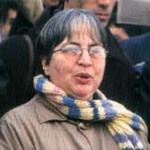Zarakolu gives the "adventure" of the Trial day by day in the press release and made a call on the press and human rights defenders to monitor the case. Durin the trial, The book's Publisher Ayse Nur Zarakolu lost her life. However, the trial about the publisher Ayse Nur Zarakolu continued.
"The first session of the trial judging Ömer Asan's book Pontos Kültürü (The Culture of Pontos), published by Ayşe Nur Zarakolu, was held on 9 July 2002 at State Security Court No. 6 of Istanbul. The trial was postponed to 1 November 2002.
Ayse Nur Zarakolu awarded
In 1998, on the occasion of the 50th anniversary of the Universal Declaration of Human Rights, the International Association of Publishers had accorded its Award for the Freedom to Publish to Ayşe Nur Zarakolu for her contributions to the freedom of thought and _expression in numerous areas.
She had then been called the"pride of publishers in Turkey and abroad". Her struggle is continuing even after her death. On 10 July 2002, researcher Ömer Asan and his book The Culture of Pontos were brought to trial. Although the book was originally published six years ago and the second printing was brought out two years ago, it has now been banned and all objections were overturned.
Very keen on supporting research into the diverse cultures of Asia Minor with a view to sustain their present existence, Ayşe Nur Zarakolu had felt great enthusiasm when publishing The Culture of Pontos, a veritable first in its domain.
Ultra-nationalists attacks
The book and its author were subjected to an odious assault by ultra-nationalist, even racist circles on a television talk show hosted by Hulki Cevizoğlu, which resulted in its prosecution.
Despite severe health problems, Ayşe Nur Zarakolu did not give up her lifelong battle for the freedom of thought and expression until her last moment.
The crass racistic attacks on The Culture of Pontos and Ömer Asan tormented her. Here is the chronology of Ayşe Nur Zarakolu's last battle:
Friday, 18 January 2002: Upon deterioration of her health situation, Ayşe Nur was taken to Kartal Hospital, where it was recommended that she be hospitalized at the Istanbul School of Medicine at Capa.
Saturday, 19 January: The vicious attacks on The Culture of Pontos and its author on the above-mentioned talk show, bordering on intellectual lynching, aggrieved her immensely. Sensing where things were heading, she asked the television to be turned off.
Monday, 21 January: Ayşe Nur was hospitalized. Upon the demand of the prosecutor, State Security Court No. 3 of Istanbul decided for the seizure of the book. The publishing house was notified and the prosecutor's office asked for the author and the publisher to report for a legal statement within the next seven days.
Thursday, 24 January: As Ayşe Nur's medical examinations and treatment were continuing, attorney Özcan Kılıç objected to the decision of seizure, which Ayşe Nur regarded as absurd in the extreme.
Friday, 25 January: Ömer Asan's statement was received at the prosecutor's office. An objection was submitted against the decision to seize the book.
Saturday/Sunday, 26-27 January: Ayşe Nur's health started to aggravate, but she persisted in following the evolution of the case attentively.
Monday, 28 January: Ayşe Nur passed away at 01:00 in the morning. The prosecutor's office requested the recording of the talk show from the TV channel, ATV. The decision of seizure was transmitted to all provincial administrations by fax and telex.
Tuesday, 29 January: An informant, having reported to the Istanbul provincial governor's office, was sent to the Istanbul Security Department, where he heaped accusations and insult on Ömer Asan and his book. He claimed that the book was written not by Ömer Asan, who, the claim went, was bought for money, but by Yorgo Andreades. Andreades had been awarded the 1994 Abdi İpekçi Turkish-Greek Friendship Prize.
Wednesday,30 January: Thousands from very diverse sectors of society attended the funeral ceremony of Ayşe Nur.
Monday, 4 February: Police visited the publishing house to register an official record to the effect that the publisher had died.
6 March: Translations of certain texts, certified by a notary in 1996 and 1997, were sent to the prosecutor's office, marked on top: "Documents showing that the person who pretends to be the author of The Culture of Pontos was bought by Professor Neoklis Sarris, divested of his citizenship of the Republic of Turkey for being an enemy of the Turks." Although the translated texts pertained to various conferences that the professor had attended and had nothing to do with the book, they were included within the case file along with the statement of the informant. Also included within the file was a decision concerning an inheritance case in which Sarris was involved, which was of course totally irrelevant to the case at hand.
24 March: The case brought against Ayşe Nur concerning the book Özgürlük Türküsü (The Song of Freedom) by Hüseyin Turhallı was postponed to 4 June, at which session the court finally passed a judgment of non-suit.
25 March: Document provided by the Department of Birth Certificates to the effect that "defendant" Ayşe Nur had passed away. This death certificate included the following interesting remark: "The person in question is being sought by police"!
26 March: Decision of the State Security Court: "Because the defendant is dead, no need to prosecute. Objection to this decision not ruled out."
From the indictment
"Because the discussion on the talk show hosted by Hulki Cevizoğlu on ATV on 12 and 19 January has shown that propaganda against the indivisible unity of the Republic of Turkey was carried out", the prosecutor has asked for the punishment of author Ömer Asan pursuant to article 8 of the Struggle Against Terrorism Act.
Turkish-Greek Friendship Prize for Asan
Ömer Asan, awarded the 1994 Turkish- Greek Friendship Prize, replied to the one and a half page indictment with a written statement of 11 pages and claimed that the indictment relied exclusively on unwarranted accusations brought forward on a TV show, which were part of a general campaign that racist circles had been waging against a variety of cultural products in the recent months.
This is how the situation is depicted in a statement by the Union of Writers of Turkey:
* In the recent period, the economic crisis that darkens our horizon has been accompanied by an intense hostility against culture exhibited by the media. The aim of this assault on a series of books, newspapers, radio stations, musical productions, theater plays and films is to strangle the freedom of _expression further and to imprison the world of culture in a straitjacket of bigotry.
* As if the threat and the bans emanating from official authorities were not enough, witch hunts are organized on certain television shows in the guise of panel discussions in order to convert certain books and their authors into targets of a chauvinistic hatred. We strongly condemn this attitude of the media posing as the judiciary and also the recent rabid hostility against culture, and plead for vigilance over these attacks on free thought." (NM)





